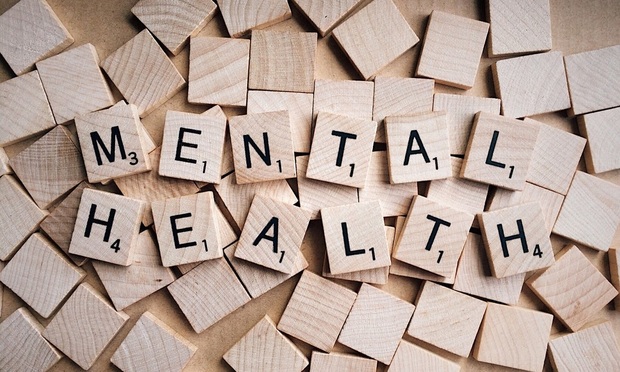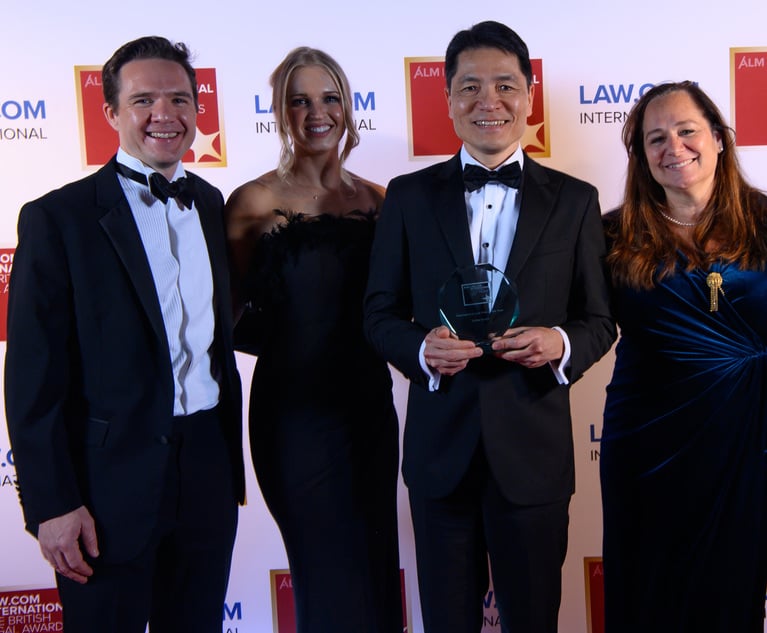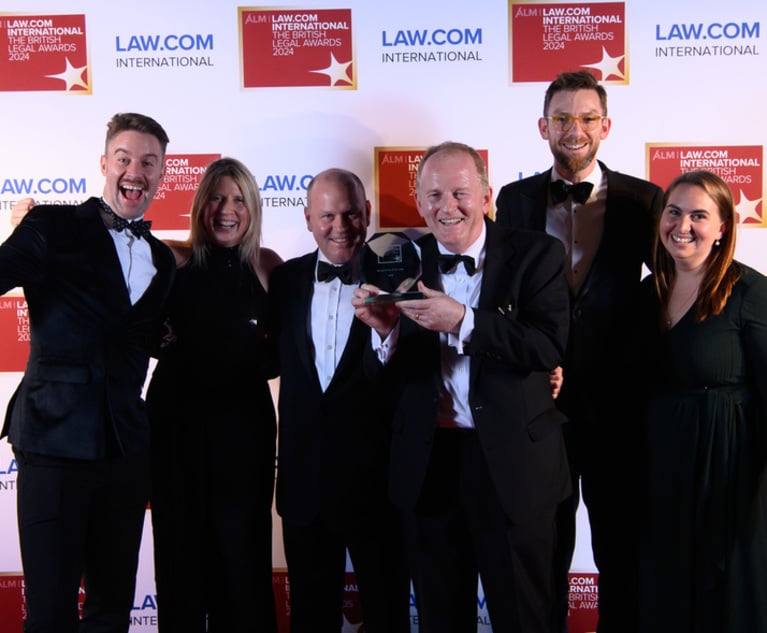'Work Was Part of My Medicine': A BCLP Associate Director on Living With a Form of Chronic Fatigue Syndrome
BCLP associate director James Parker shares his experiences of living with the illness and how it is possible to recover.
May 17, 2019 at 12:09 AM
6 minute read

Bryan Cave Leighton Paisner associate director and father of two young children James Parker suffered from a form of chronic fatigue syndrome two years ago. He shared his story with Legal Week as part of Mental Health Awareness Week, to shed some light on the difficulties he faced while combatting poor mental health in the workplace.
What were your symptoms?
I'd had a serious heart infection about nine months before, and the next time I got ill I seemed unable to recover – I was becoming more and more tired and hence resting more and more. This gradually evolved into a whole series of physical symptoms – seemingly anything that could go wrong with my body did so – anything from exhaustion, breathlessness, feeling dizzy, dissociation, an inability to stand up for very long, anxiety and palpitations. The list was long.
Eventually, I was referred to a specialist fatigue clinic at London Bridge and was diagnosed with post-viral (or chronic) fatigue syndrome. The diagnosis was a revelation, as by that point I wasn't sure anyone would be able to tell me what was wrong. It was explained to me that effectively my fight-or-flight reaction had got stuck and was always turned on. Imagine you're walking home from work tonight and a car nearly hits you – you'd go into fight-or-flight mode. Apparently I was in that state permanently. I've read into the area a lot since and it seems that there are many different forms of this condition, with differing causes and with widely varying impacts on peoples' lives.
How did that impact your working life?
For a period I was only able to work from home. That's where the firm and my clients were amazing. I was able to work quite happily, but it was where I was able to work from that was the main obstacle I had to contend with.
Modern technology and the nature of my work meant that I already frequently worked away from the office and, with a very supportive team, I was able to keep my working life as normal as possible, through what was an extremely traumatic experience, not only for me but for my young family too.
"Work was part of my medicine"
Did you take any time off work?
I had to have one week off work entirely, after I'd picked up a bad bug. But in a way, work was part of my medicine – of maintaining normality when it felt like my whole life was changing forever. Working each day was engaging my mind and keeping me mentally active.
With careful support and management from my HR colleagues, I was keen and able to work as much as I sensibly could. I know that I am quite motivated by my work, because I'm passionate about it and enjoy it, so I asked my HR colleague to be my 'angel on my shoulder' whenever it looked like I was trying to take on too much.
How did you juggle work life and family life while suffering from mental health issues?
Looking back, I think it was an incredibly hard time for my family and especially my wife, Laura, as we have two young children. She was frankly amazing and managed whatever my mind and body threw at us. Even when we countenanced that I may never recover and what we'd do about the mortgage and our family home, she was always supportive.
One day, one of the partners in my team rang and asked to speak with my wife, and the basic message was, 'we are here to help him recover – even if that means we need to turn his email off and ban him from working'! That support was, I know, a huge boost.
How did you get better?
The first step was always searching for an answer, until eventually I got a diagnosis. After that, I think things that helped were primarily cognitive behavioural therapy (CBT) with 'graded exercise therapy', and implementing the steps I learned from both those combined with meditation.
I started using things like the meditation app, Headspace, and I started doing yoga on a weekly basis, which I'm still doing now. Added to this, I did a huge amount of reading around the topic and saw what had worked for or helped others, including using positive affirmations.
For me, I had to teach my brain to default to a positive thought cycle. Getting outside and for short walks helped, as did laughter – even just watching a bit of comedy on TV.
"In a way I found I was just hiding away"
How did it feel to get back into the professional environment?
What I felt was relief – I've known my team for a very long time, and it was wonderful to be back with everyone. I had a sense of achievement and comfort of being back around old friends. The second part – and this was the tricky bit – was that because of what my brain thought were my physical boundaries, commuting into the office was a big barrier to getting back into the office environment. My brain had gone into the cycle to tell itself that I couldn't do that, so that was something the CBT helped me break through.
What would your advice be to people who are experiencing something similar to what you experienced?
Clearly your GP is often a good first port of call, but sometimes the specialist nature of the issues faced (and certainly this was the case for me), mean that it's important to then turn to other resources. If needs be, get a second or third opinion.
At BCLP we are lucky enough to have mental health first-aiders, as well as dedicated private medical phone services. Talking to friends with medical knowledge or similar experiences also helped.
Then ultimately in recovery it was about a combination of CBT, mindfulness, meditation, yoga, and treating myself well – be that exercise, good food, or just laughter.
You will get through it and you will be stronger for it.
This content has been archived. It is available through our partners, LexisNexis® and Bloomberg Law.
To view this content, please continue to their sites.
Not a Lexis Subscriber?
Subscribe Now
Not a Bloomberg Law Subscriber?
Subscribe Now
NOT FOR REPRINT
© 2025 ALM Global, LLC, All Rights Reserved. Request academic re-use from www.copyright.com. All other uses, submit a request to [email protected]. For more information visit Asset & Logo Licensing.
You Might Like
View All
International Law Firm of the Year: A Q&A with Sidley Austin's London Managing Partner
5 minute read
Inside Travers Smith's AI Training, Development Efforts

From Olympic Aspirations to Legal Innovation: Tom Dunlop's Journey to Founding Summize
8 minute readTrending Stories
- 1Can a Law Firm Institutionalize Its Culture? Boies Schiller’s New Chairman Will Try
- 2Full 8th Circuit Hears First Amendment Challenge to School District’s ‘Equity Training’
- 3Exploring Generative AI’s Impact on Intellectual Property
- 4Training Lawyers in AI and Using AI to Boost Training
- 5EB-5 Rebounds After a Rocky Year: Challenges of 2024 Lay Groundwork for a Booming 2025
Who Got The Work
J. Brugh Lower of Gibbons has entered an appearance for industrial equipment supplier Devco Corporation in a pending trademark infringement lawsuit. The suit, accusing the defendant of selling knock-off Graco products, was filed Dec. 18 in New Jersey District Court by Rivkin Radler on behalf of Graco Inc. and Graco Minnesota. The case, assigned to U.S. District Judge Zahid N. Quraishi, is 3:24-cv-11294, Graco Inc. et al v. Devco Corporation.
Who Got The Work
Rebecca Maller-Stein and Kent A. Yalowitz of Arnold & Porter Kaye Scholer have entered their appearances for Hanaco Venture Capital and its executives, Lior Prosor and David Frankel, in a pending securities lawsuit. The action, filed on Dec. 24 in New York Southern District Court by Zell, Aron & Co. on behalf of Goldeneye Advisors, accuses the defendants of negligently and fraudulently managing the plaintiff's $1 million investment. The case, assigned to U.S. District Judge Vernon S. Broderick, is 1:24-cv-09918, Goldeneye Advisors, LLC v. Hanaco Venture Capital, Ltd. et al.
Who Got The Work
Attorneys from A&O Shearman has stepped in as defense counsel for Toronto-Dominion Bank and other defendants in a pending securities class action. The suit, filed Dec. 11 in New York Southern District Court by Bleichmar Fonti & Auld, accuses the defendants of concealing the bank's 'pervasive' deficiencies in regards to its compliance with the Bank Secrecy Act and the quality of its anti-money laundering controls. The case, assigned to U.S. District Judge Arun Subramanian, is 1:24-cv-09445, Gonzalez v. The Toronto-Dominion Bank et al.
Who Got The Work
Crown Castle International, a Pennsylvania company providing shared communications infrastructure, has turned to Luke D. Wolf of Gordon Rees Scully Mansukhani to fend off a pending breach-of-contract lawsuit. The court action, filed Nov. 25 in Michigan Eastern District Court by Hooper Hathaway PC on behalf of The Town Residences LLC, accuses Crown Castle of failing to transfer approximately $30,000 in utility payments from T-Mobile in breach of a roof-top lease and assignment agreement. The case, assigned to U.S. District Judge Susan K. Declercq, is 2:24-cv-13131, The Town Residences LLC v. T-Mobile US, Inc. et al.
Who Got The Work
Wilfred P. Coronato and Daniel M. Schwartz of McCarter & English have stepped in as defense counsel to Electrolux Home Products Inc. in a pending product liability lawsuit. The court action, filed Nov. 26 in New York Eastern District Court by Poulos Lopiccolo PC and Nagel Rice LLP on behalf of David Stern, alleges that the defendant's refrigerators’ drawers and shelving repeatedly break and fall apart within months after purchase. The case, assigned to U.S. District Judge Joan M. Azrack, is 2:24-cv-08204, Stern v. Electrolux Home Products, Inc.
Featured Firms
Law Offices of Gary Martin Hays & Associates, P.C.
(470) 294-1674
Law Offices of Mark E. Salomone
(857) 444-6468
Smith & Hassler
(713) 739-1250









